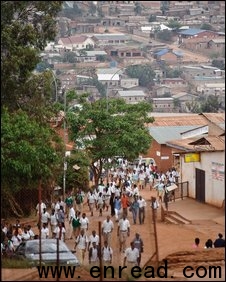| ||||||||||||||||||||||||||||||||||||||||||||||||||||||||||||||||||||||||
|
Landlocked Rwanda is weeks away from completing a link to a new fibre-optic network promising1 high-speed internet for East Africa, officials say. 官员称,被陆地包围的卢旺达与东非新光纤高速网络之间的联通仅需要数周时间。  Preparations are being made to turn Rwanda into a hi-tech hub Engineers expect the capital, Kigali, to be connected to newly-arrived undersea cables in Kenya by November. A national fibre-optic ring is due to go online early in 2010. The new link is the key part of a plan to transform Rwanda from an impoverished2(贫困的,赤贫的), agricultural society into a hi-tech economic innovator3. Most of Rwanda's nine million inhabitants still make a living from small-scale farming, and much of the country remains4 without basic services - including a reliable electricity supply. Yet 15 years after a genocide, which saw around 800,000 Rwandans brutally5 murdered, the government - led by one-time rebel leader President Paul Kagame - appears determined6 to push ahead with development on multiple fronts. Rwanda remains one of the poorest countries in the world, but has a fast-growing population, of which more than 50% are aged7 14 or under. "We're in a hurry," Patrick Nyirishema told the BBC. "In five or 10 years' time, all those people are going to be looking for jobs." Mr Nyirishema, a slight man of 34, took up his post at the helm of Rwanda's Information Technology Authority just one week ago. He found 160 ongoing8 projects in his in-tray(公文格). "Rwanda is the most densely-populated country in the continent, and most of our people are subsistence farmers(自给农民)," he said. "We can't wait until we have water, until we have built roads, before we get round to ICT (information and communications technology). We have to do everything at the same time." Held back Evidence of Africa's need for faster connectivity is easy to spot. In central Kigali, towering satellite dishes belonging to one private company bring in most of the country's existing internet bandwidth. As in other parts of East Africa which have long relied on satellite connections, the links are in the hands of a handful of operators and are sold on at high prices way out of reach of most ordinary Rwandans. For a country which has publicly stated an ambition to turn itself into "the Singapore of Africa" - a globally important centre for business and communications - the reliance on satellite has held the country back. Most Rwandans lack significant computer skills and few have regular access to the internet. Many of those who do are yet to explore the web's full potential. "I first used the internet one year ago," said Carine Umulisa, a 24-year-old Kigali student. "I sometimes go to the cyber cafe and I send messages to my family. It's very expensive now. But it's important for Rwanda to develop technology." Even where there is bandwidth, people struggle with unpredictable connections. A bus carrying 20 laptop computers is currently travelling the country offering internet services to students and local business people. When BBC News visited the bus in Kamonyi district, an area just 30 minutes' drive from Kigali but without any mains electricity, the connection was so erratic9(不稳定的,奇怪的) that the young people using the facility were unable even to sign up for their first e-mail account. 点击  收听单词发音 收听单词发音
|
||||||||||||||||||||||||||||||||||||||||||||||||||||||||||||||||||||||||
- 发表评论
-
- 最新评论 进入详细评论页>>



